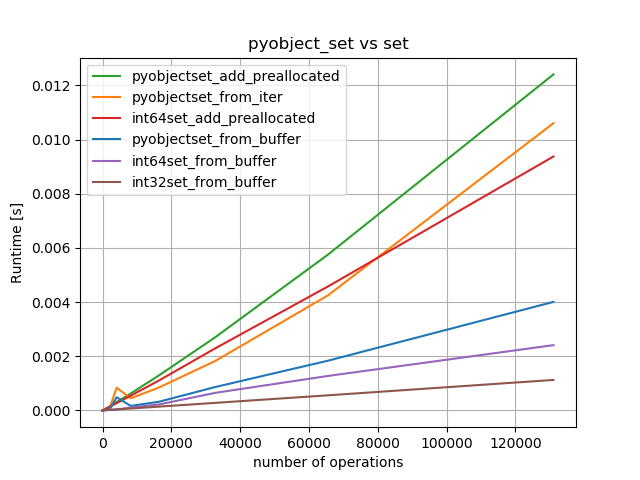1
2
3
4
5
6
7
8
9
10
11
12
13
14
15
16
17
18
19
20
21
22
23
24
25
26
27
28
29
30
31
32
33
34
35
36
37
38
39
40
41
42
43
44
45
46
47
48
49
50
51
52
53
54
55
56
57
58
59
60
61
62
63
64
65
66
67
68
69
70
71
72
73
74
75
76
77
78
79
80
81
82
83
84
85
86
87
88
89
90
91
92
93
94
95
96
97
98
99
100
101
102
103
104
105
106
107
108
109
110
|
# Performance:
Run `sh run_perf_tests.sh` in tests-folder to reproduce. numpy and pandas need to be installed in addition to be able to run the performance tests. The easiest way is to call first `sh test_instalation.sh p3 local keep` and then activate it via `. ../p3/bin/activate` and only then call the performance tests, or to run `sh test_in_active_env.sh` to install in developer-mode in the current environment.
#### Memory consumption of sets:
Peak memory usage for N int64-integers (inclusive python-interpreter):
10^3 10^4 10^5 10^6 10^7
python2-set 6MB 6MB 13MB 62MB 502MB
python3-set 8MB 9MB 17MB 79MB 588MB
cykhash (p3) 10MB 10MB 10MB 26MB 147MB
i.e. there is about 4 time less memory needed.
#### pd.unique()
Warning: cykhash's version of `unique` doesn't not return uniques in order of appearance (which pandas' version does!). `cykhash.unique` returns a object with buffer-interface, which can be used for creation of numpy-arrays via `np.frombuffer`.
The implementation of pandas' `unique` uses a hash-table instead of hash-set, which results in a larger memory footprint. `cykhash.unique_int64` (or `unique_int32`, `unique_float32`, `unique_float64`) uses much less memory and is also faster. See also question https://stackoverflow.com/questions/51485816/curious-memory-consumption-of-pandas-unique for more details.

There is no int32-version in `pandas`, such there is no difference to 64bit. `int32`-version of `cykhash` is twice as fast as `int64`-version, which is about factor 1.66 faster than the pandas' version. Run `tests/perf_tests/khashunique_vs_pdunique.py` to generate the plot.
Peak memory overhead (additional needed memory given as `maximal_overhead_factor`) for unique (run `tests/perf_tests/run_memory_unique_test.sh` to generate the numbers). i.e. additional memory needed is `N*maximal_overhead_factor`
N pd.unique() cykhash.unique_int64
1e6 6.24 2.18
2e6 6.19 2.15
4e6 6.35 2.16
6e6 4.86 1.44
8e6 6.25 2.16
9e6 7.50 1.90
While `pd.unique` needs up to 8 times the original memory, `cykhash` at most 3 times the original memory. For the special case of `int32` the overhead-factor of `pd.unique` more than doubles because it doesn't have a dedicated int32-version and data must be converted to int64.
More precise the worst case scenario (while still without triggering rehashing) for `cykhash.unique_int64`, the overhead-factor can be `1.3*2*(1+1/64)=2.64` where:
* 1.3 due to the fact that rehashing happens when more than 77% of buckets are occupied.
* 2 due to the fact, that khash doubles the size every time
* 1+1/64 that one bit is used for flags
#### isin
Compared to pandas' `isin`, which has a linear running time in number of elements in the lookup. cykhash's `isin` has a `O(1)` in the number of elements in the look-up:
n pandas(#look-up=10^n) cykhash(#look-up=10^n)
2 0.0009466878400417045 0.0008094332498149015
3 0.0011027359400759451 0.001505808719957713
4 0.001315673690114636 0.0005093092197785154
5 0.007601776499941479 0.00031931002013152465
6 0.11544147745007649 0.000292295379913412
7 0.7747500354002114 0.00047073251014808195
#### PyObjectSet:
There are no advantages (others that nans are handled correctly, more about it later) to use khash-version for normal Python-objects.
A big issue, is that `PyObject_Hash` works well with Python's dict/set implementation, but less so with khash.
By running `python tests/perf_tests/pyobjectset_vs_set.py` we get the following results:

It is only 2 times slower than Python-set for inserting elements (but still somewhat not quite linear?. However it has also a negative impact on `insert`:

As conclusion:
* `contains` are almost equally fast for `set`/`PyObjectSet`.
* `insert` is slightly slower for `PyObjectSet`, preallocation should be used whenever possible.
* `discard` is quite slow for `PyObjectSet`.
Insertion of Python-integers is 50% slower than the insertion of 64bit integers (see `tests/perf_tests/object_vs_int64_via_buffer.py`):

Using `PyObjectSet_from_buffer` is about 2.5 times faster than from iterator and 3 times faster than using `add`.
For best performance use `Int64Set` or, even better, `Int32Set`, which is about factor 2 faster than the 64bit-version.
#### PyObjectMap:
There are similar observation as for `PyObjectMap`, see `map_object_vs_int64_via_buffer.py` and `pyobjectmap_vs_dict.py` in 'tests/perf_tests`-folder.
The results are slightly worse (all above discard):

and

Also here the performance of the 64bit/32bit variant much better:

|